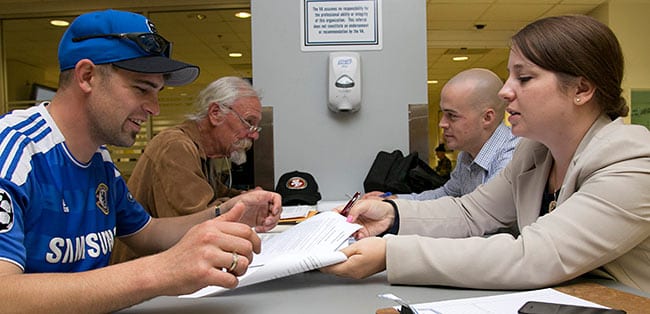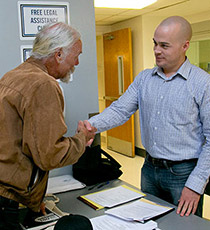
By Susan Gluss
As the nation prepares to celebrate Veterans Day, Berkeley Law students are launching new initiatives to help U.S. combat vets fight for healthcare benefits and more.
The scars of war are hard to hide and hard to heal. For many veterans, the emotional toll combined with debilitating physical injuries can make it tougher to survive on home soil than on the battlefield. That difficulty is not lost on law students, many of whom are vets themselves.
The war zone
Mark Zambarda earned a Silver Star Medal for combat valor in Afghanistan, the third-highest military decoration. He and his fellow veterans understand better than any civilian what it’s like to fight in—and survive—a war zone.
On July 15, 2009, Zambarda led his platoon on patrol in Afghanistan. It was a “high-profile” operation, and the infantrymen soon captured armed Taliban insurgents. But as Zambarda and his soldiers led their captives back to camp, they stumbled into a “really bad ambush.”
It was hot, about 108 degrees. The soldiers were out of ammunition; and out of water. They had lost all communications and were pinned down by enemy fire. They were outnumbered—and outgunned.
Zambarda figured they were lost without back-up. With no way to call for artillery support, and no way to tell anyone where they were holed up, Zambarda decided to make a run for help. He told his sergeant the plan, and then quickly scrambled through a patch of open land—and enemy fire.
“Things were exploding and bullets were flying around me,” he said. He ran for about 45 minutes in the brutal heat on rough, rocky terrain. He made it to base and directed artillery and air support to save his platoon. In short order, the added firepower enabled the stranded soldiers to escape.
Every single soldier got out alive. “It was a good day,” Zambarda said with a grin.
An Afghan ally in trouble
In Afghanistan, Adrian Kinsella led a platoon tasked with counterinsurgency operations and a range of hazardous duties. They depended heavily on their Afghani interpreter, Mohammad, for survival.
“Mohammad patrolled with my Marines day and night, facing enemy fire and improvised explosive devices [IEDs],” Kinsella wrote in a local newspaper. “He was shot at twice and hit with an IED while serving coalition forces. His contribution went far beyond interpretation; we considered him one of our own.”
But insurgents discovered Mohammad’s alliance with coalition forces. “In retaliation, the Taliban tortured and killed his father. They kidnapped his 3-year-old brother, threatening the same fate,” Kinsella wrote.
Mohammad got his brother back, but he and his family had to flee for their lives. For the past three years, Kinsella has been waging a relentless paper war against a recalcitrant U.S. bureaucracy to secure a visa for Mohammad and his family. (Read about it here.)
As second-year law student and active duty Marine Adrian Kinsella put it, “It takes a vet to understand a vet.”
Kinsella, who served as a platoon leader in Afghanistan, is now one of 18 students engaged in a new legal clinic for military veterans at the San Francisco VA Medical Center. The center reached out to Berkeley Law’s Veterans Law Practicum to launch the free clinic, and a union was born.
The practicum is an ideal choice for the VA. It is a hands-on program that helps veterans and their families pursue health care and disability claims, from initial filing to appeal. Launched in 2009, it’s led by Professor John Yoo and co-taught by lecturer Kyndra Rotunda. Student enrollment—men and women, vets and non-vets—has more than doubled. The active caseload is now three times higher than it was four years ago.
The collaboration between the practicum and the VA is part of a nationwide move by the agency to connect veterans in need of legal help with law schools, firms, bar associations, and other groups.
The Berkeley Law-VA Medical Center student-run clinic is the first of its kind in California. In addition to helping vets fight for disability, pension, and other benefits, students also assist with military discharge upgrades and minor civil law matters.
Veterans can drop in or make an appointment. And they have—in droves. In the first two weeks, more than two dozen veterans sought counsel. The clinic itself is pretty bare bones: a small table and chairs in the medical center’s waiting room.

veteran at the clinic.
“We had an overwhelming number of veterans attempting to make appointments and even more who showed up for walk-ins,” said Gabriella Ahdoot ’15. “They were extremely grateful to have someone sit down with them and listen. The issues ranged from family law, legal malpractice, employment law, disability, fraud, and questions about parole.”
“They really were chomping at the bit,” said Mark Zambarda ’15. “They were right there, waiting for the clinic to open.”
“Word got around fast,” said Allen Huang ’15. “We were very busy.”
VA Medical Center Senior Staff Attorney Janice Bressler said she’s already received “rave reviews” about the clinic from veterans and medical staff alike.
“Legal needs can often be upstream causes of very serious medical needs,” Bressler said. “From the tremendous response we’ve had from veterans, we’ll be looking into increasing the clinic’s hours and days in coming semesters.”
Students staff the free clinic every Friday, from 1 pm to 3 pm. Bressler said their help “in more fully documenting and organizing veterans’ benefits claims” could help speed the filing process. Other complex cases may be referred to members of the state bar, including Berkeley Law alums who might be willing to supervise the students’ legal work.
Help is sorely needed
California is home to the largest population of veterans in the country. In the state and nationwide, hundreds of thousands of vets are suffering from a benefits backlog. Compounding the problem, more than 62,000 veterans are homeless on any given night; many suffer from post-traumatic stress disorder and substance abuse. Another 140,000 are in prison.
To help fill a need, members of the Boalt Association of Military Veterans (BAMV) are forming a Veterans’ Rights Students-Initiated Legal Services Project (SLPS), expected to be up and running by spring 2014. BAMV member May Whitaker ’15 is leading the effort, starting with a launch event on November 12.
“The goal is to involve more students in pro bono legal work for veterans,” particularly first-year classmates who could earn credit towards a public interest grant, Whitaker wrote in an email. It would also “increase the visibility of student vets and veterans’ legal needs” within the law community at large.
The veterans’ SLPS plans to partner with the VA’s Support Services for Veterans Families and the East Bay Community Recovery Project. Law students, under the supervision of project staff and attorneys, will help with outreach, case management, and benefits claims. The group will also collaborate with Swords to Plowshares, a veterans’ advocacy group.
A common bond
Yet another student initiative—and another first in California—helps vets at San Quentin State Prison. Specifically, students enrolled in the Veterans Practicum prepare briefs and related documents for the inmates’ parole hearings.
Zambarda is writing a legal memo for a combat vet imprisoned for 30 years. The brief fleshes out the inmate’s post-release plan—and the actions he’ll take to “contribute to society.”
“I want the parole board to look at the totality of the man’s life,” said Zambarda, including wartime incidents that the parole board “might not have considered.”
Zambarda says warfare creates a common bond among the military—forged out of mutual respect and sacrifice. That bond means veterans at Boalt are committed to helping other vets, no matter how hard the case, no matter how long it takes.
“Veterans are in the practicum because we know what it’s like,” said Zambarda. “We’re dedicated to veterans’ causes. It’s more than just a yellow ribbon or a sticker on your car. It’s ‘practice what-you-preach.’”
The work of law students—whether at San Quentin or the VA, in class or consultation—is creating a stronger foundation of support for Bay Area veterans and their families: a bright light in an otherwise dark terrain.